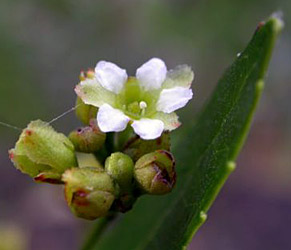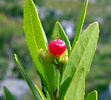Gerrardinaceae
Gerrardina
Mac H. Alford


This tree diagram shows the relationships between several groups of organisms.
The root of the current tree connects the organisms featured in this tree to their containing group and the rest of the Tree of Life. The basal branching point in the tree represents the ancestor of the other groups in the tree. This ancestor diversified over time into several descendent subgroups, which are represented as internal nodes and terminal taxa to the right.

You can click on the root to travel down the Tree of Life all the way to the root of all Life, and you can click on the names of descendent subgroups to travel up the Tree of Life all the way to individual species.
For more information on ToL tree formatting, please see Interpreting the Tree or Classification. To learn more about phylogenetic trees, please visit our Phylogenetic Biology pages.
close boxIntroduction
Gerrardina is a genus of two species native to southern and eastern Africa. Traditionally, the genus has been placed in the polyphyletic family Flacourtiaceae due to its gross similarities with tribe Homalieae, which have alternate, simple, toothed leaves, receptacular disk glands, and stamens opposite petals. However, Gerrardina differs from tribe Homalieae, now placed in Salicaceae, by having apical placentation, small embryos, different leaf teeth, and a mucilaginous foliar epidermis. Analyses of plastid DNA data indicate that Gerrardina is related to Brassicales, Huerteales, Malvales, and Sapindales, but further placement has not been possible given the data presently available.
Characteristics
Shrubs or small trees, sometimes scandent. Leaves simple, alternate, stipulate; venation pinnate; margins serrate. Inflorescences axillary, in few-flowered raceme-like cymes. Flowers hermaphroditic, actinomorphic, perigynous. Calyx lobes 5, persistent, aestivation imbricate. Corolla lobes 5, caducous. Stamens 5, opposite petals; anther dehiscence longitudinal, introrse. Disk present, cupular, adnate to the hypanthium. Gynoecium of 2 carpels united to form a compound, superior ovary (though recessed in the receptacle) topped by a single style with a subcapitate or minutely bifid stigma; ovary unilocular; ovules 4, anatropous, borne on 2 placentae, pendulous from near the apex. Fruits pendulous, dry or fleshy berries with 1-4 seeds. Seeds exarillate; embryo minute, erect.
References
Alford, M. H. 2006. Gerrardinaceae: a new family of African flowering plants unresolved among Brassicales, Huerteales, Malvales, and Sapindales. Taxon 55: 959-964.
Killick, D. J. B. 1976. Flacourtiaceae. Pp. 53-92 in J. H. Ross, ed. Flora of South Africa. Vol. 22. Botanical Research Institute, Pretoria.
Milne-Redhead, E. 1939. Gerrardina eylesiana Milne-Redhead. Hooker's Icon. Pl., Fifth Series 4: 1-2, t. 3390.
Oliver, D. 1870. Gerrardina foliosa, Oliv. Hooker's Icon. Pl., Third Series 1: 60. t. 1075.
Sleumer, H. O. 1975. Flacourtiaceae. In R. M. Polhill, ed. Flora of Tropical East Africa. Crown Agents for Oversea Governments and Administrations, London.
Title Illustrations

| Scientific Name | Gerrardina foliosa |
|---|---|
| Location | South Africa: Eastern Cape Province: Lupatana |
| Specimen Condition | Live Specimen |
| Identified By | Tony Dold |
| Body Part | Flower |
| Collection | USMS, GRA |
| Collector | T. Dold |
| Copyright | © 2006 Tony Dold |
| Scientific Name | Gerrardina foliosa |
|---|---|
| Location | South Africa: Eastern Cape Province: Lupatana |
| Specimen Condition | Live Specimen |
| Identified By | Tony Dold |
| Collection | USMS, GRA |
| Collector | T. Dold |
| Copyright | © 2006 Tony Dold |
About This Page
Mac H. Alford

University of Southern Mississippi, Hattiesburg, Mississippi, USA
Correspondence regarding this page should be directed to Mac H. Alford at
Page copyright © 2009 Mac H. Alford
 Page: Tree of Life
Gerrardinaceae. Gerrardina.
Authored by
Mac H. Alford.
The TEXT of this page is licensed under the
Creative Commons Attribution-NonCommercial License - Version 3.0. Note that images and other media
featured on this page are each governed by their own license, and they may or may not be available
for reuse. Click on an image or a media link to access the media data window, which provides the
relevant licensing information. For the general terms and conditions of ToL material reuse and
redistribution, please see the Tree of Life Copyright
Policies.
Page: Tree of Life
Gerrardinaceae. Gerrardina.
Authored by
Mac H. Alford.
The TEXT of this page is licensed under the
Creative Commons Attribution-NonCommercial License - Version 3.0. Note that images and other media
featured on this page are each governed by their own license, and they may or may not be available
for reuse. Click on an image or a media link to access the media data window, which provides the
relevant licensing information. For the general terms and conditions of ToL material reuse and
redistribution, please see the Tree of Life Copyright
Policies.
- First online 06 February 2007
- Content changed 06 February 2007
Citing this page:
Alford, Mac H. 2007. Gerrardinaceae. Gerrardina. Version 06 February 2007 (under construction). http://tolweb.org/Gerrardina/93755/2007.02.06 in The Tree of Life Web Project, http://tolweb.org/









 Go to quick links
Go to quick search
Go to navigation for this section of the ToL site
Go to detailed links for the ToL site
Go to quick links
Go to quick search
Go to navigation for this section of the ToL site
Go to detailed links for the ToL site